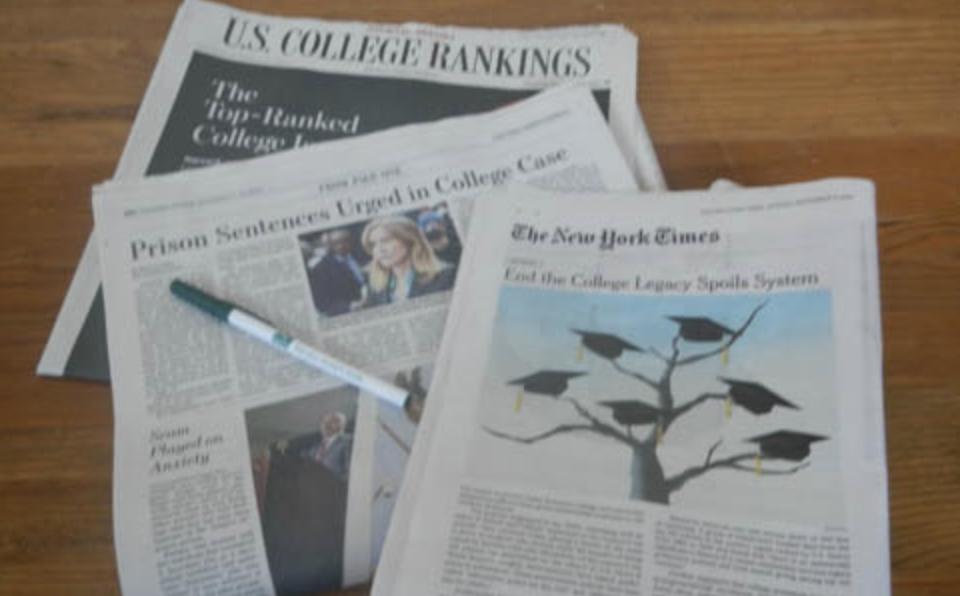More than a few leaders in academia are nervous about the on-going college admissions scandal. Rich and privileged parents, including actress Felicity Huffman, paid thousands of dollars to get their kids into elite colleges. The scandal has focused on Rick Singer, a “consultant” who employed a variety of tactics, including arranging for private proctors to abet cheating on the SAT, bribing coaches to support special admissions based on false claims of athletic excellence, and using “donations” in exchange for the waiver of admissions standards. All pretty bad, but it might not be the biggest worry for academia. The overall admissions process is dysfunctional and in need of reform.
Partially as a result of the Singer case, how colleges select students for admission is under increasing scrutiny. This started long before the current scandal. Legacy admissions, a practice that gives preference to the offspring of alumni, has been under attack for more than a decade. Other preferences, such as rewarding donors with special consideration for applicants, are also under attack. Proposed solutions include cutting off federal funds.
College leaders, especially at elite private institutions, are watching closely. All admissions standards not based on merit are under scrutiny. These include not only legacy admissions, but preferences for athletes, offspring of staff and faculty members, and even celebrities. In all these cases, the assumption is that the system works to the benefit of wealthy, probably white, students to the detriment of more meritorious students.
One can hope that the prosecution of Mr. Singer and the parents involved in the current scandal will increase the integrity of the process. Unfortunately, even if that happens, and even if other minor reforms are made, the bias of the current system will remain. Simply put, bright but disadvantaged students must have the same chances of winning admission to elite colleges as students without those disadvantages.
The current system, using SAT scores, grades, and extra-curricular activities as heavily weighted criteria excludes many gifted students. For a fair system, the weight given these criteria needs to change, by adding new criteria or adjusting current ones. The personal circumstances of individual students, such as the quality of the schools they attended, the ability of their parents to facilitate involvement in athletics or community activities, and even things like access to adequate nutrition and health care, somehow should be added to the mix. This is not an easy fix, but one worth exploring.
Importantly, some of these issues are already on the radar screen. Progress has already been made. The College Board, for example, has adopted an “adversity score” to adjust outcomes based on identifiable factors that might cause students to score lower on the exam as a result. Many colleges are also increasing the qualitative examination of applicants, a process which, if employed with integrity, will go a long way to making the process more equitable.
Also, in considering college opportunity and success, the fact that low-income students are succeeding in college in increasing numbers should be remembered. Many students also assume that getting into an elite college is essential to success in life. It isn’t. For many students there are hundreds of great colleges that in many cases may provide an individual student with an equally good or better education than they would have gotten at one of the so-called elite schools. Examples are easy to find.
While progress is being made, the admissions process remains in need of fundamental reform. The need is urgent. Each year another cohort of high school graduates must live with the current system. Are there any quick fixes out there without the pitfalls inherent in developing more complicated formulas for evaluating students? Is more radical reform worth a look? Can it be done without increasing federal intrusion into the governance of institutions of higher education, something that could arguably undermine the uniqueness or excellence of some institutions? For example, the “elite” nature of Harvard and similar schools is arguably as much a matter of the composition of the student body as it is of the quality of the faculty. Would Harvard be Harvard without it’s “cream of the crop” student body?
Clearly, reform will be complicated and controversial. Despite that, one can hope that the college admissions scandal will prompt more serious, comprehensive, efforts to make college admissions more equitable. Work needs to be expedited, pursued with urgency and involve the key stakeholders, especially students, academia, and taxpayers.
It’s time to support the American Dream by making college admissions fair.
J.E. Dean of Oxford is a retired attorney and public affairs consultant. He is a former counsel to the House Committee on Education and Labor. For more than 30 years, he advised clients on federal education and social service policy. He is the former chairman of the National College Access Network (NCAN), a group promoting success in higher education among underrepresented groups, and KnowledgeWorks Foundation, a national leader in strategic foresight and education innovation



Write a Letter to the Editor on this Article
We encourage readers to offer their point of view on this article by submitting the following form. Editing is sometimes necessary and is done at the discretion of the editorial staff.